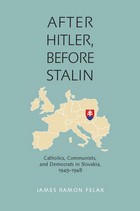
Felak opens by providing a background on pre-war and wartime Slovak politics, notably the rise of Slovak Catholic nationalism and Slovakia's alignment with Nazi Germany during World War II. He then describes the union formed in the famed “April Agreement” of 1946 between the Democratic Party and Catholics that guaranteed a landslide victory for the Democrats and insured a position for Catholics in the new regime. Felak views other major political events of the period, including: the 1947 Czechoslovak war crimes trial of Father Jozef Tiso; education policy; the treatment of the Hungarian minority; the trumped-up “anti-state conspiracy” movement led by police in the Fall of 1947; and the subsequent Communist putsch.
Through extensive research in Slovak national archives, including those of the Democratic and Communist parties, After Hitler, Before Stalin assembles a comprehensive study of the predominant political forces and events of this tumultuous period and the complex motivations behind them.
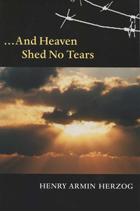
1995 paperback, Saga Publishers / Folio Private
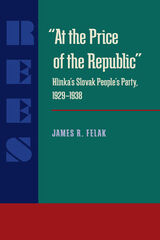
Slovak nationalist sentiment has been a constant presence in the history of Czechoslovakia, coming to head in the torrent of nationalism that resulted in the dissolution of the Republic on January 1, 1993. James Felak examines a parallel episode in the 1930s with Slovak nationalists achieved autonomy for Slovakia-but “at the price” of the loss of East Central Europe's only parliamentary democracy and the strengthening of Nazi power.
The tensions between Czechs and Slovaks date back to the creation of Czechoslovakia in 1918. Slovaks, who differed sharply in political tradition, social and economic development, and culture, and resented being governed by a centralized administration run from the Czech capital of Prague, formed the Slovak People's Party, led by Roman Catholic priest Ankrej Hlinka. Drawing heavily on Czech and Slovak archives, Felak provides a balanced history of the party, offering unprecedented insight into intraparty factionalism and behind-the-scenes maneuvering surrounding SSP's policy decisions.
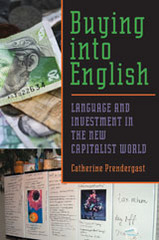
Many developing countries have little choice but to “buy into English” as a path to ideological and material betterment.
Based on extensive fieldwork in Slovakia, Prendergast assembles a rich ethnographic study that records the thoughts, aspirations, and concerns of Slovak nationals, language instructors, journalists, and textbook authors who contend with the increasing importance of English to their rapidly evolving world. She reveals how the use of English in everyday life has becomes suffused with the terms of the knowledge and information economy, where language is manipulated for power and profit.
Buying into English presents an astute analysis of the factors that have made English so prominent and yet so elusive, and a deconstruction of the myth of guaranteed viability for new states and economies through English.
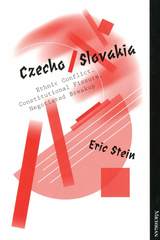
For more than three years after the implosion of the Communist regime in 1989, the Czechs and Slovaks negotiated the terms of a new relationship to succeed the centralized federation created under communism. After failing to agree to the terms of a new union, the parties agreed on an orderly breakup.
In the background of the narrative loom general issues such as: What are the sources of ethnic conflict and what is the impact of nationalism? Why do ethnic groups choose secession and what makes for peaceful rather than violent separation? What factors influence the course of postcommunist constitutional negotiations, which are inevitably conducted in the context of institutional and societal transformation? The author explores these issues and the reasons for the breakup.
Eric Stein, a well-known scholar of comparative law and a native of Czechoslovakia, was invited by the Czechoslovak government to assist in the drafting of a new constitution. This book is based on his experiences during years of work on these negotiations as well as extensive interviews with political figures, journalists, and academics and extensive research in the primary documents. It will appeal to historians, lawyers, and social scientists interested in the process of transformation in Eastern Europe and the study of ethnic conflict, as well as the general reader interested in modern European history.
Eric Stein is Hessel E. Yntema Professor Emeritus, University of Michigan Law School. He previously served with the United States Department of State in the Legal Advisor's Office. He is the author of many books and articles on comparative law and the law of the European Community.
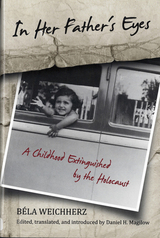
In Her Father's Eyes is a moving tale about Jewish life and a father's profound love for his only child. By bridging prewar and wartime periods, the diary also provides a rich context for understanding the history from which the Holocaust emerged.

How is it that Czechoslovakia’s separation into two countries in 1993 was accomplished so peacefully—especially when compared with the experiences of its neighbors Russia and Yugoslavia? This book provides a sociological answer to this question—and an empirical explanation for the breakup of Czechoslovakia—by tracing the political processes begun in the Prague Spring of 1968.
Gil Eyal’s main argument is that Czechoslovakia’s breakup was caused by a struggle between two fractions of what sociologists call the “new class,” which consisted primarily of intellectuals and technocrats. Focusing on the process of polarization that created these two distinct political elites, Eyal shows how, in response to the events of the ill-fated Prague Spring, Czech and Slovak members of the “new class” embarked on divergent paths and developed radically different, even opposed, identities, worldviews, and interests. Unlike most accounts of postcommunist nationalist conflict, this book suggests that what bound together each of these fractions—and what differentiated each from the other—were not national identities and nationalist sentiments per se, but their distinctive visions of the social role of intellectuals.
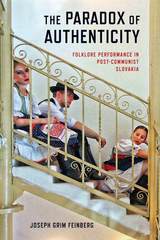
In Slovakia and elsewhere in Eastern Europe after World War II, Communist governments promoted folklore revivals and staged performances of song and dance as representations of "the people." When the Communists fell from power in Slovakia in 1989, folklore was also discredited in the eyes of many. By the early twenty-first century, however, a new generation launched a movement to revive folklore's reputation and reintroduce it to a broad public.
Weaving together personal narrative, ethnographic analysis, and philosophical reflection, Feinberg examines the aspirations and difficulties of young folk dance devotees as they recognize that authenticity is more easily prized than achieved. He sheds new light on the problems of specialized performance and broad participation, the uneasy relationship between folklore and the public sphere, and the paradoxical pursuit of authenticity in the modern world.
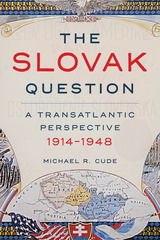
Winner, 2022 SSA Best Book Prize
The so-called Slovak question asked what place Slovaks held—or should have held—in the former state of Czechoslovakia. Formed in 1918 at the end of World War I from the remains of the Hungarian Empire, and reformed after ceasing to exist during World War II, the country would eventually split into the Czech Republic and Slovakia after the “Velvet Divorce” in 1993.
In the meantime, the minority Slovaks often clashed with the majority Czechs over their role in the nation. The Slovak Question examines this debate from a transatlantic perspective. Explored through the relationship between Slovaks, Americans of Slovak heritage, and United States and Czechoslovakian policymakers, it shows how Slovak national activism in America helped the Slovaks establish a sense of independent identity and national political assertion after World War I. It also shows how Slovak American leaders influenced US policy by conceptualizing the United States and Slovakia as natural allies due to their connections through immigration. This process played a critical role in undermining attempts to establish a united Czechoslovakian identity and instead caused a divide between the two groups, which was exploited by Nazi Germany and then by other actors during the Cold War, and proved ultimately to be insurmountable.
READERS
Browse our collection.
PUBLISHERS
See BiblioVault's publisher services.
STUDENT SERVICES
Files for college accessibility offices.
UChicago Accessibility Resources
home | accessibility | search | about | contact us
BiblioVault ® 2001 - 2024
The University of Chicago Press









